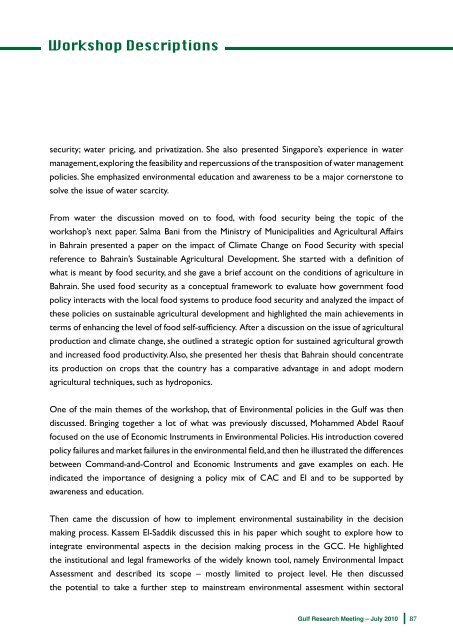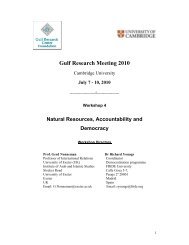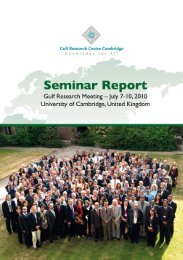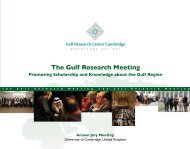GRM 2010 Report - Centre of Islamic Studies - University of ...
GRM 2010 Report - Centre of Islamic Studies - University of ...
GRM 2010 Report - Centre of Islamic Studies - University of ...
You also want an ePaper? Increase the reach of your titles
YUMPU automatically turns print PDFs into web optimized ePapers that Google loves.
security; water pricing, and privatization. She also presented Singapore’s experience in water<br />
management, exploring the feasibility and repercussions <strong>of</strong> the transposition <strong>of</strong> water management<br />
policies. She emphasized environmental education and awareness to be a major cornerstone to<br />
solve the issue <strong>of</strong> water scarcity.<br />
From water the discussion moved on to food, with food security being the topic <strong>of</strong> the<br />
workshop’s next paper. Salma Bani from the Ministry <strong>of</strong> Municipalities and Agricultural Affairs<br />
in Bahrain presented a paper on the impact <strong>of</strong> Climate Change on Food Security with special<br />
reference to Bahrain’s Sustainable Agricultural Development. She started with a definition <strong>of</strong><br />
what is meant by food security, and she gave a brief account on the conditions <strong>of</strong> agriculture in<br />
Bahrain. She used food security as a conceptual framework to evaluate how government food<br />
policy interacts with the local food systems to produce food security and analyzed the impact <strong>of</strong><br />
these policies on sustainable agricultural development and highlighted the main achievements in<br />
terms <strong>of</strong> enhancing the level <strong>of</strong> food self-sufficiency. After a discussion on the issue <strong>of</strong> agricultural<br />
production and climate change, she outlined a strategic option for sustained agricultural growth<br />
and increased food productivity. Also, she presented her thesis that Bahrain should concentrate<br />
its production on crops that the country has a comparative advantage in and adopt modern<br />
agricultural techniques, such as hydroponics.<br />
One <strong>of</strong> the main themes <strong>of</strong> the workshop, that <strong>of</strong> Environmental policies in the Gulf was then<br />
discussed. Bringing together a lot <strong>of</strong> what was previously discussed, Mohammed Abdel Raouf<br />
focused on the use <strong>of</strong> Economic Instruments in Environmental Policies. His introduction covered<br />
policy failures and market failures in the environmental field, and then he illustrated the differences<br />
between Command-and-Control and Economic Instruments and gave examples on each. He<br />
indicated the importance <strong>of</strong> designing a policy mix <strong>of</strong> CAC and EI and to be supported by<br />
awareness and education.<br />
Then came the discussion <strong>of</strong> how to implement environmental sustainability in the decision<br />
making process. Kassem El-Saddik discussed this in his paper which sought to explore how to<br />
integrate environmental aspects in the decision making process in the GCC. He highlighted<br />
the institutional and legal frameworks <strong>of</strong> the widely known tool, namely Environmental Impact<br />
Assessment and described its scope – mostly limited to project level. He then discussed<br />
the potential to take a further step to mainstream environmental assesment within sectoral<br />
Gulf Research Meeting – July <strong>2010</strong> 87





